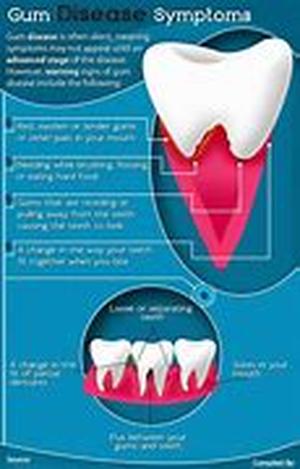
An Overview Of Gum Disease And Heart DiseasePlaque, A Substance That Consists Of Food Remains And Bacteria, Is The Major Cause Of Gum Disease. Plaque Covers Teeth And If Not Removed, Irritates The Gums And Causes Bleeding. If Plaque Continues To Build Up, The Gums Become Inflamed And Pockets Start To Form Surrounding The Tooth. The Pocket Accumulates More Plaque That In Time Turns Into Tartar Or Calculus, A Hard Deposit That Normal Brushing Cannot Remove. If Tartar Worsens, Gum Infection Occurs And Can Progress Into Chronic Gum Disease, Affecting Jawbone And Causing Teeth To Fall Out.In Heart Disease, A Different Kind Of Plaque Made Up Of Fatty Deposits Build Up In The Walls Of Arteries, Causing A Condition Called Atherosclerosis. This Condition Narrows The Passageway Of Blood, Making It Difficult For Blood To Flow Properly. Heart Attacks And Stroke Happen When Arteries Are Blocked Preventing The Passage Of Blood To The Heart And Brain. What Are The Common Factors Between Gum Disease And Heart Disease? Researchers Discovered That People Who Are At Risk Of Heart Disease Have Higher Levels Of White Blood Cells And Significantly Thicker Carotid Arteries. These Two Conditions Are Also Present In Individuals Who Have High Levels Of The Specific Kinds Of Bacteria That Bring About Gum Diseases. This Means That A Person With Gum Disease Is More Likely To Develop Heart Disease. How Is Gum Disease And Heart Disease Related?Gum Disease Links To The Development Of Atherosclerosis, Which Is The Narrowing Of Arteries That Can Cause Heart Attacks Or Stroke. Some Studies Suggest That The Process Of Arterial Blockage Is Sped Up By The Bacteria Which Causes Gum Infections And Gum Diseases. Other Research Studies Also Relate How Bacteria In Gum Infections Can Penetrate The Bloodstream, And Contribute To Inflammation In The Arterial Walls And Clotting. Some Theorizes That Once The Bacteria Have Made Its Way To The Blood, It Causes Even More Constriction In The Arteries By Bonding With The Plaque Of Existing Fatty Substances.In Addition, Gum Disease And Heart Disease Share Some Similar Triggers Such As Smoking And Poor Dietary Nutrition. Persons Who Are Experiencing Symptoms Of Gum Disease Should Consult A Dentist Or A Specialist In The Treatment Of Gum Or Periodontal Diseases. Regular Dental Check-ups And Maintenance Are Necessary To Manage Gum Diseases And The Associated Risk Of Heart Disease.





